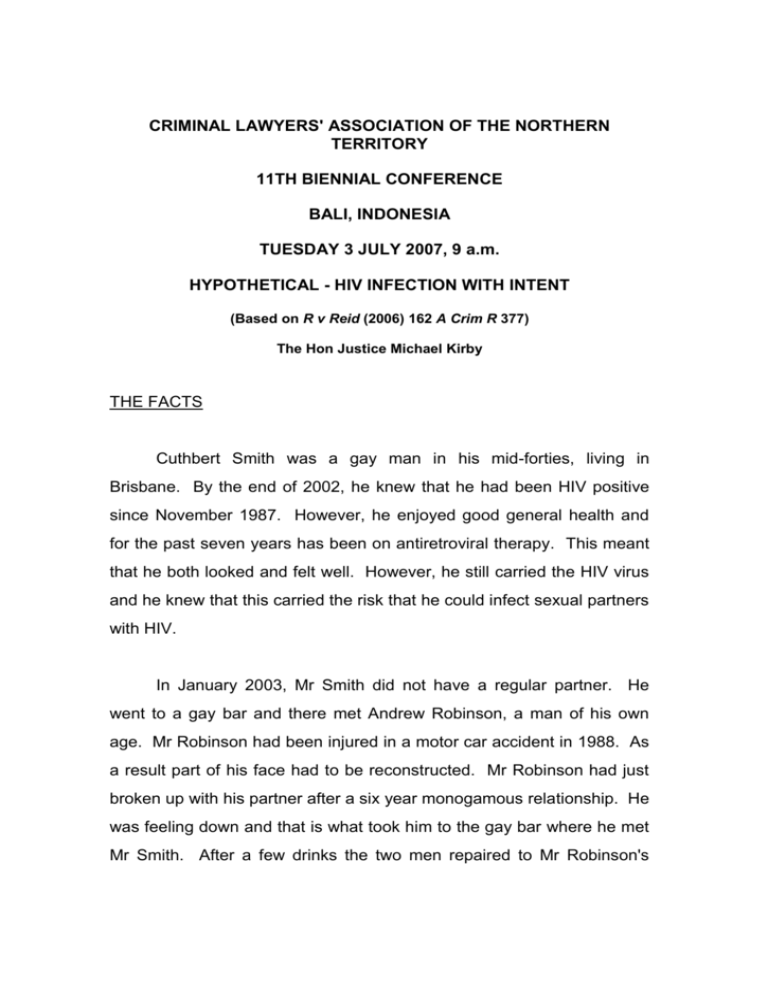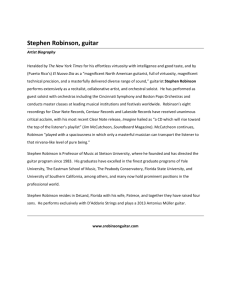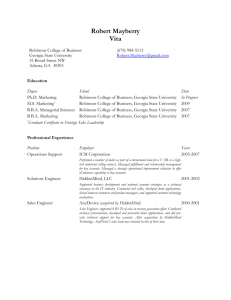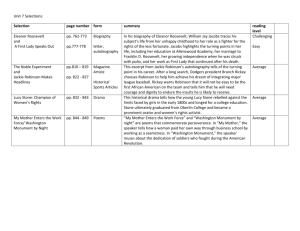
CRIMINAL LAWYERS' ASSOCIATION OF THE NORTHERN
TERRITORY
11TH BIENNIAL CONFERENCE
BALI, INDONESIA
TUESDAY 3 JULY 2007, 9 a.m.
HYPOTHETICAL - HIV INFECTION WITH INTENT
(Based on R v Reid (2006) 162 A Crim R 377)
The Hon Justice Michael Kirby
THE FACTS
Cuthbert Smith was a gay man in his mid-forties, living in
Brisbane. By the end of 2002, he knew that he had been HIV positive
since November 1987. However, he enjoyed good general health and
for the past seven years has been on antiretroviral therapy. This meant
that he both looked and felt well. However, he still carried the HIV virus
and he knew that this carried the risk that he could infect sexual partners
with HIV.
In January 2003, Mr Smith did not have a regular partner. He
went to a gay bar and there met Andrew Robinson, a man of his own
age. Mr Robinson had been injured in a motor car accident in 1988. As
a result part of his face had to be reconstructed. Mr Robinson had just
broken up with his partner after a six year monogamous relationship. He
was feeling down and that is what took him to the gay bar where he met
Mr Smith. After a few drinks the two men repaired to Mr Robinson's
2.
home. Before they had any sexual contact, Mr Smith told Mr Robinson
that he was HIV negative, having been tested on 2 November 2002.
The following day the two men met again and this time they had
oral sex followed by anal intercourse. Mr Robinson said that he did not
like using condoms. Mr Smith told him that this "was fine because he
was HIV negative".
Later they alternated sexual positions and on a
number of occasions Mr Smith had unprotected intercourse with Mr
Robinson. In all, Mr Robinson estimated that they had unprotected anal
intercourse three or four times a week. This lasted for several weeks
whilst they were seeing each other regularly.
About a month after the first meeting, in February 2003, Mr
Robinson developed diarrhoea, a high fever and welts all over his body.
He could not keep his food down and had no energy. He went to his
doctor for a HIV test. At first the results were inconclusive. However, a
repeat test indicated that Mr Robinson had sero-converted and was now
HIV positive. When he told Mr Smith, the latter said that he must have
been given the virus by his former sexual partner. Mr Smith said that he
would have a blood test performed. From that time the two men had no
further sexual contact with each other.
On
Mr Smith's
recommendation,
Mr
Robinson made
an
appointment to see Dr George Jones, a medical practitioner specialising
in HIV treatment. He was the same doctor as Mr Smith was seeing. Mr
Smith suggested to Mr Robinson that he should tell Dr Jones that he and
3.
Mr Smith were having safe sex from the beginning. Soon after this, Mr
Robinson came to believe that it was Mr Smith who had transmitted the
virus to him. Thereafter he had no further contact with Mr Smith.
A few weeks later the two men met at the same gay bar. Mr
Smith taunted Mr Robinson on front of the other patrons saying "Who
would want you now? You're HIV positive".
This led Mr Robinson to make a complaint to police. A test was
performed on Mr Robinson's former sexual partner during the six year
relationship. That test was returned HIV negative.
The police charged Mr Smith with an offence against the Criminal
Code (Q), s 317(b). That provision make its an offence "with intent to
transmit a serious disease to another person". Mr Smith said that he
was not guilty. He undertook an interview with police in December 2003
which was later tendered in evidence. In the course of the interview he
said that he knew that he had been HIV positive since November 1987.
That he had lived together with Mr Robinson for a time in early 2003 and
had sex without condoms. He said that he had told Mr Robinson that he
was HIV positive. He claimed that notwithstanding this, Mr Robinson
had insisted on having intercourse without condoms. He had allegedly
explained "You know, I had my head reconstructed. I mean what else
can kill me?".
ejaculation.
Mr Smith admitted to having oral sex but without
The relationship with Mr Robinson had broken up
acrimoniously when he assaulted Mr Smith.
When asked by police
4.
whether he had ejaculated while having anal sex with Mr Robinson he
said: "I have no idea. Probably not. I - I still can't ejaculate even with a
positive partner. You know? Inside of me, it still feels like I'm carrying a
loaded gun with me". When asked "Why did you say that?", Mr Smith
said: "Well, for goodness sake. I've got a terminal disease. I'd rather
not pass it on to someone else. I've had sixteen years of hell. Why the
hell should I give someone else that?".
Later in the course of the
interview Mr Smith admitted that he had ejaculated inside Mr Robinson.
In the course of the interview, Mr Smith also acknowledged that
he was aware of the availability of so-called PEP treatment - a postexposure prophylaxis which can prevent infection after unprotected sex
provided it is undertaken within a day or two of the unprotected
intercourse. Mr Smith described his having unprotected sex with Mr
Robinson as "completely irresponsible" and "stupid in the extreme".
However, he denied that he had transmitted the serious disease of HIV
to Mr Robinson "with intent to transmit a serious disease". He said that
his only "intent" had been to have consensual sex. His was not a case
of deliberately passing HIV to his companion. That was furthest from his
mind.
He was prepared to admit that he had been careless, even
reckless in pursuit of sex which was mutual and consensual, between
adult gay men. He argued that Mr Robinson, as a gay man, was well
aware of the risks of unprotected sex and knew of the dangers of HIV.
He should have taken his own responsibility to protect himself.
Protection was a mutual thing.
5.
The trial judge declined to instruct the jury on the meaning of the
words "with intent". He said that they were words of ordinary English. It
was for the jury to decide whether the case reached the level of an
intentional transmission of a serious disease. The jury found Mr Smith
guilty of the offence charged.
QUESTIONS
(1)
What does "with intent" mean in this context? Is it a phrase of
ordinary English meaning? Should the judge have tried to explain
it to the jury? Were there any dangers in failing to explain the
meaning of the phrase?
(2)
What is the relevance of the complainant's own detailed
knowledge about HIV and his own responsibility to protect himself
from infection by always insisting on the use of condoms, at least
for sexual intercourse with new partners and strangers?
Does
that knowledge make the sex a mutual thing and remove the
existence of "intent"?
(3)
In the facts, was it the "intent" of the accused to pass the virus to
the complainant?
Or was his sole "intent" the shared sexual
pleasure with an adult sexual partner?
(4)
How do you distinguish "with intent" from "with carelessness" or
"with gross recklessness"?
(5)
Mr Smith told police that he thought there was a one in two
chance of transmitting the virus on unprotected intercourse. In
6.
fact, the statistical risk is more like 1:100. Was his mistake about
this assumption relevant to his "intent"?
(6)
Is it relevant to the accused's "intent" at the time of unprotected
sexual intercourse that he knew of a therapy that could have been
utilised within one or two days to prevent sero-conversion to HIV?
Is his failure to recommend that course to Mr Robinson relevant to
his "intent" at the time of repeated sexual intercourse?
(7)
Is it in society's interests to intrude the criminal law into adult
private consensual sexual conduct? Should society be trying to
encourage everyone to take responsibility, including for their own
health? Does making it a crime to pass the virus "with intent"
discourage people from finding out their HIV status because it
proves knowledge? Is this a good policy for the law to pursue?
(8)
Would it be different if it could be shown that the accused had, in
similar circumstances, transmitted HIV to a number of other
persons, all of whom had trusted his assurance that he had been
tested and was negative?
The Court of Appeal of Queensland [2006] QCA 202 upheld the
jury's conviction by majority. McPherson JA dissented.
CRIMINAL LAWYERS' ASSOCIATION OF THE NORTHERN
TERRITORY
11TH BIENNIAL CONFERENCE
BALI, INDONESIA
TUESDAY 3 JULY 2007, 9 a.m.
HYPOTHETICAL - HIV INFECTION WITH INTENT
(Based on R v Reid (2006) 162 A Crim R 377)
The Hon Justice Michael Kirby







